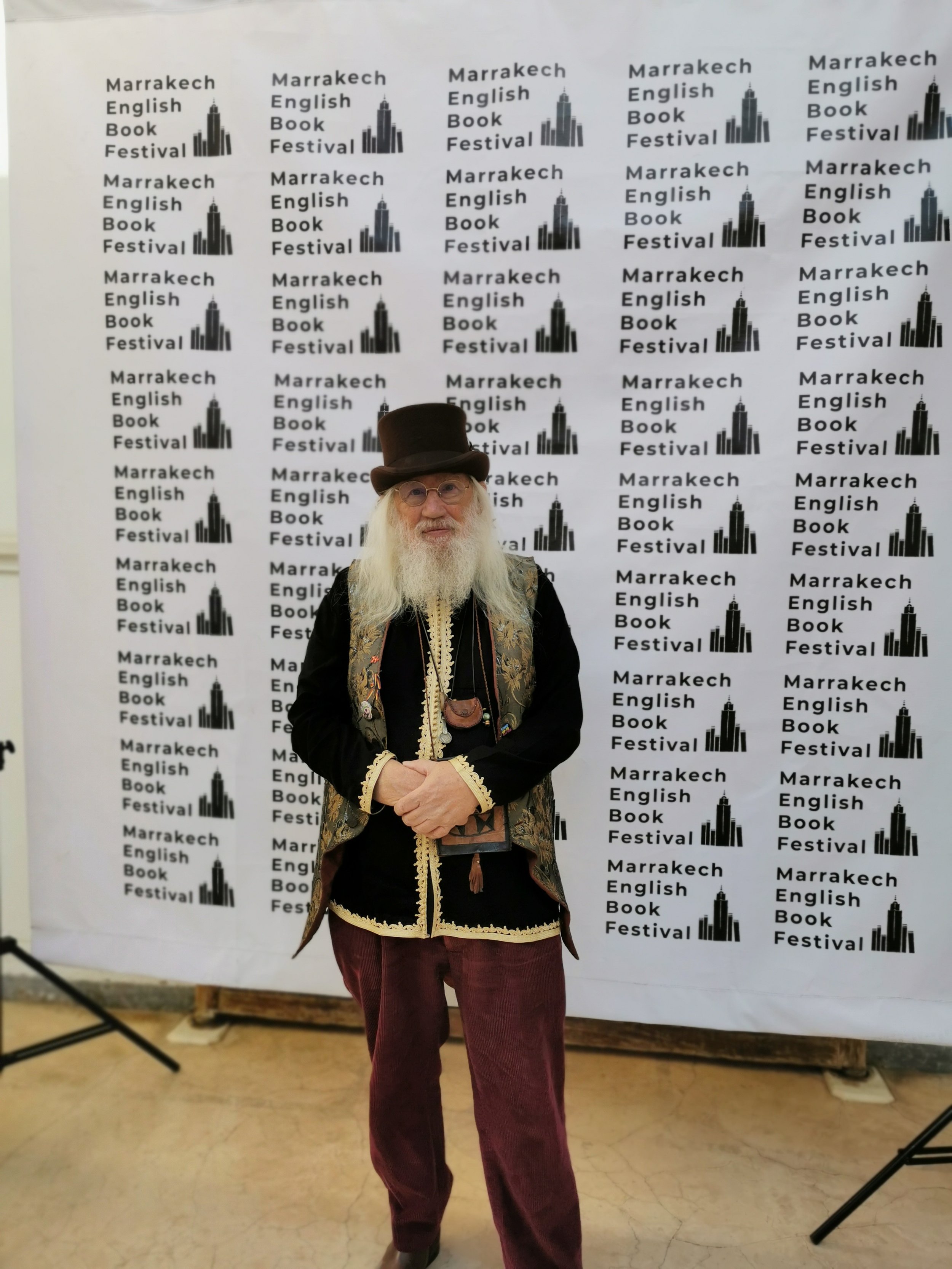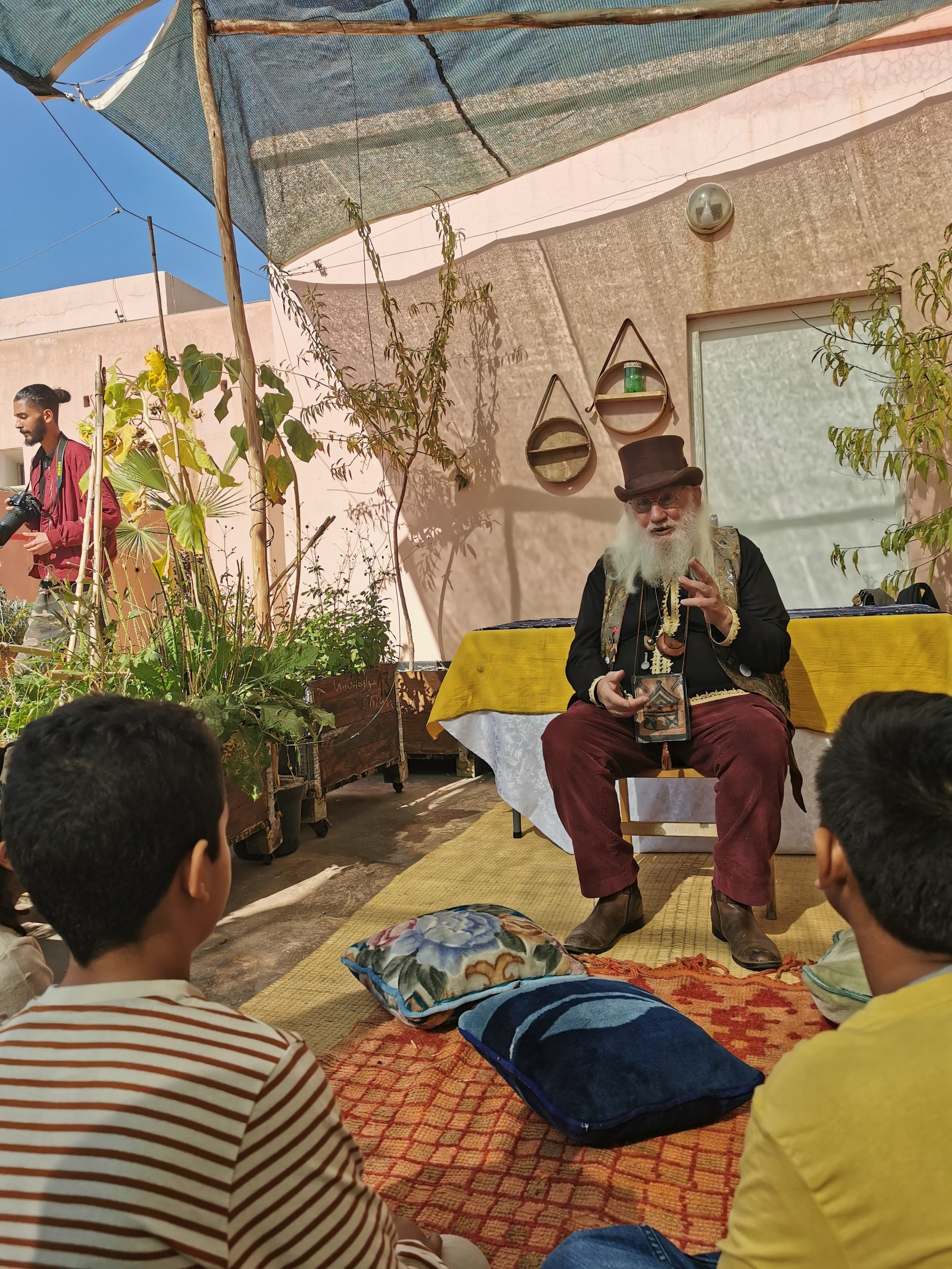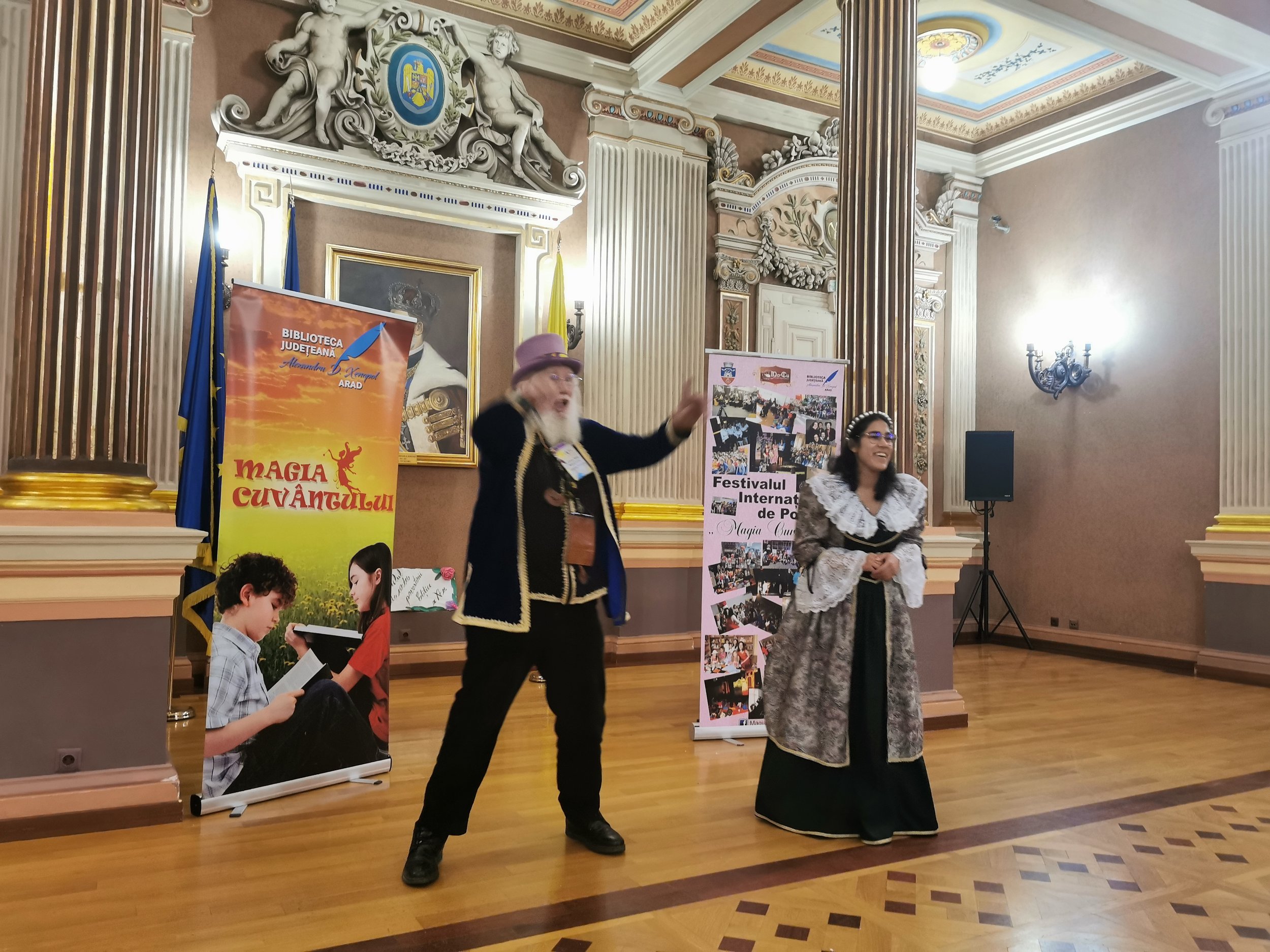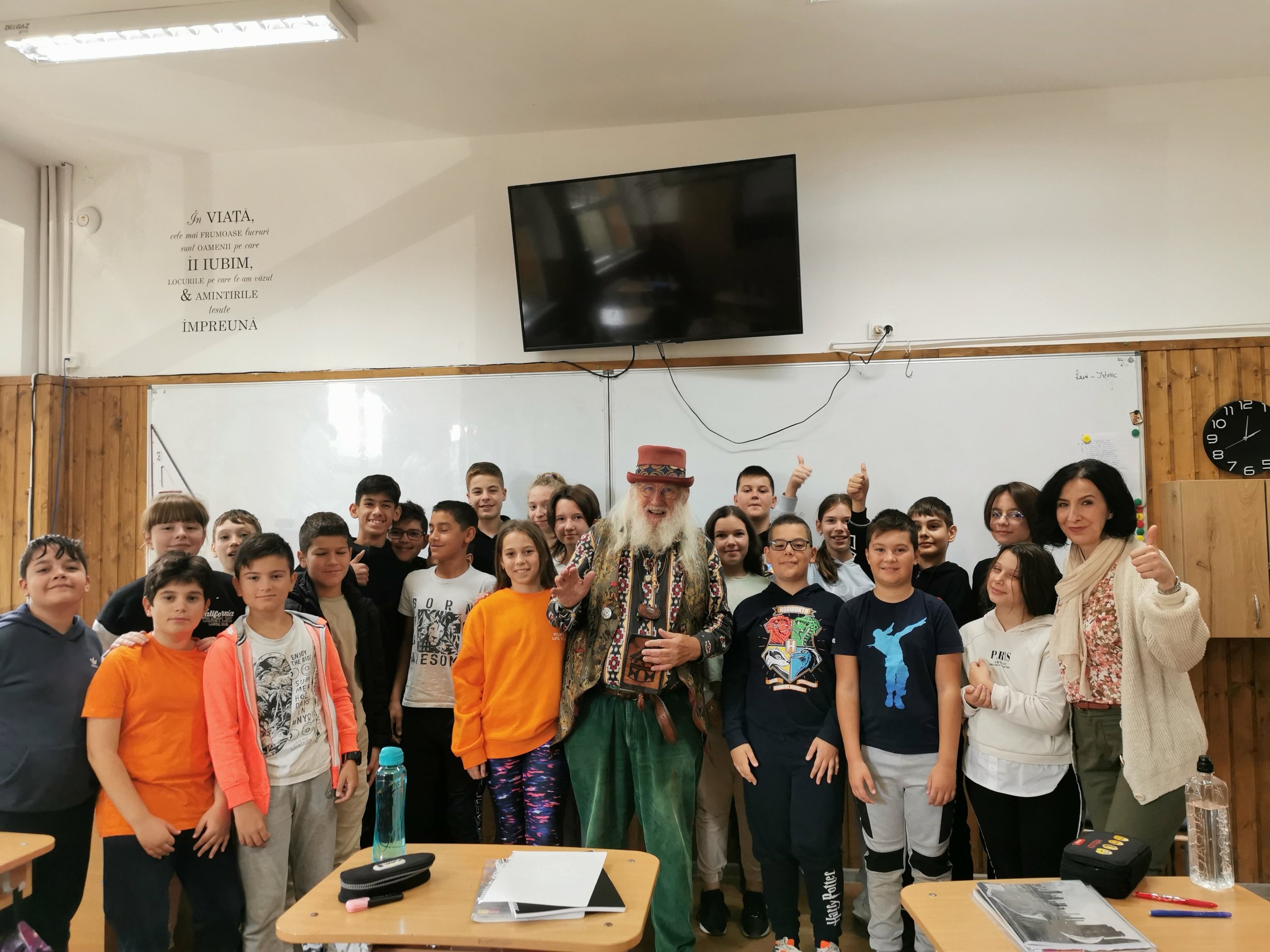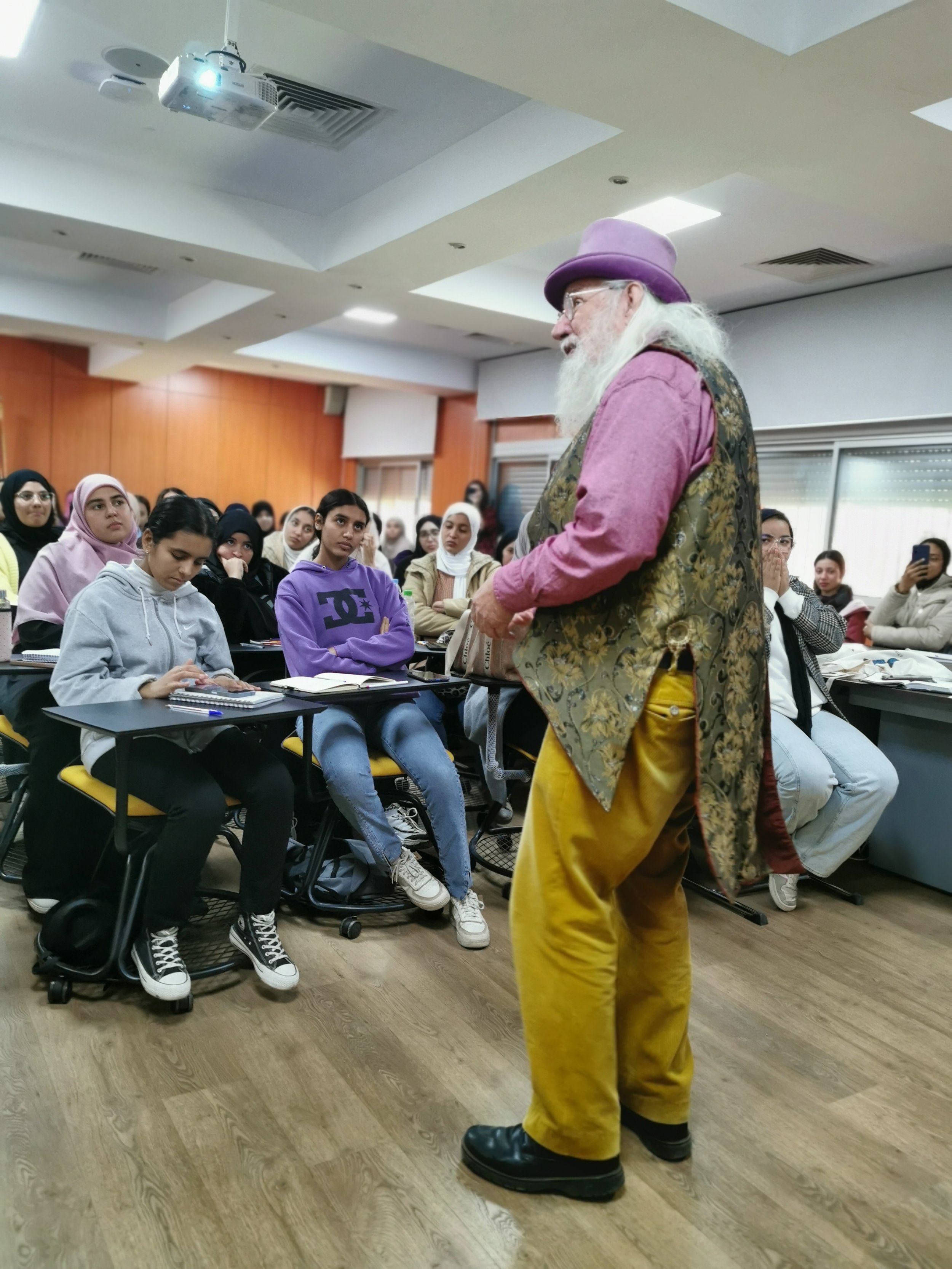January Artist of the Month – John Row
Our January ‘Artist of the Month’ is legendary storyteller and poet John Row.
About John Row.
John Row , poet and storyteller has been writing and performing for over half a century. He has told stories, recited his poetry and run workshops on four continents in schools, prisons, museums, libraries and festivals.
He is curator of worldstorytellingcafe.com and a founder and director of the Marrakech International Storytelling Festival.
What a visit from John Row entails
As a qualified teacher, John understands how schools operate and employs a flexible approach adapting to the needs of the school. He has a presentation specifically designed for Key Stage One and material suitable for Key Stages Two and Three.
With younger children John links his stories to the birds and animals they might find in the countries the stories originate from.
With older pupils he places stories in a historical context.
All performances and workshops are interactive and he encourages pupils to participate.
John’s performances and workshops touch on many aspects of the national curriculum especially speaking and listening.
John can place the emphasis of each session on either stories or poems depending on the needs of the school. He uses anecdotes to bring the art of writing alive and builds stories with students in a way that allows children of all abilities to participate. John’s experience of storytelling in the teaching of English as an additional language is invaluable in classrooms where children may be experiencing language difficulties.
You can read more about John and his school visits here
Interview with John Row
What first interested you in Storytelling?
My interest stems from my childhood. We didn’t have television and my mother read me folk tales from a set of Arthur Mee’s Children’s Encyclopedias. My father was in the navy and came home a few times a year and told me stories of his travels and his youth on Vancouver Island. Decades later, in the mid eighties, when I managed a bookshop in Colchester Arts Centre we booked The Company of Storytellers I realised this was an artform I could embrace.
You are very passionate and proactive in the storytelling community – can you tell us about some of the events you have started/oversee/contributed to?
I suppose one of the things I am proudest of is being the curator of worldstorytellingcafe.com. I was asked to do this by Mike Wood who owns riads in Marrakech. We started this at the beginning of lockdown and attracted over two hundred tellers. There are thousands of stories archived on the site. The child of this is the Marrakech International Storytelling Festival which I co direct with Zouhair Khaznaoui, a young dynamic Moroccan teller.
Beyond this I have been managing the storytelling tent on the Kidz Field at Glastonbury Festival for over twenty years and established a storytelling area at Cambridge Folk Festival for the same amount of time introducing new and established tellers to a new audience.
I have just been asked to manage the storytelling at Chippenham Folk Festival.
Do feel storytelling is for all ages?
I never think of storytelling as being for just children or just adults. It is for the whole family. If you look at photographs of shanakee’s in Ireland in the fifties there is everyone from the great grandmother to the babe in arms crammed into a cottage listening to these travelling tellers.
What are the benefits of sharing stories?
Obviously the primary object of sharing stories is to spread joy and enjoyment. For me the more I listen to stories from around the world and I hear different versions of the same stories it reinforces the belief there is more that unites us than divides us. Stories give strength and hope in the most desperate of times as well as helping us laugh at archetypical villains and monsters. They give access to literature to those who have difficulties reading. The list goes on and on.
You are one of our most versatile acts and able to work with all ages, group sizes and abilities. How do you manage to adapt your sessions so well?
Thank you. We adapt all the time in life. We choose different words an actions in different situations. It is the same with storytelling.
Fundamentally you have to like people and accept that every audience is different.
You also write poetry – is there an overlap with storytelling or a different skillset?
Poetry and storytelling have an obvious overlap insomuch as they both use words and rhythm but a poem is usually set down and while storytelling does not use a script and leaves much more scope for improvisation..
Many stories though are told in verse. Ballads being an obvious example. My ideal set to perform is a mixture of stories and poems.
Do you have a favourite piece of work in your ‘Out of the Hat’ book?
The most adaptable story and one that I use most often is the Ribbon Maiden I love the way the main character stands up to the emperor.
What tale or performance have you seen that has made a lasting impression on you?
I think the most influential moment was driving the great Scots Traveller storyteller, Duncan Williamson around in my van and listening to him tell stories and sing songs as we crossed the country. Recently a fourteen year old teller from Punjab who comes on our international young tellers program on the website has been making a lasting impression on me.
You have been visiting schools and sharing the written and spoken word for many years – what has kept you in this line of work?
It is a cliche but if you do what you love you never do a days work in your life applies. I love to see smiling faces and the enthusiasm of children all over the world. I meet people from all walks of life and travel all the time. What could be better?
What has been your favourite moment from a school visit so far?
There have been so many great moments in schools it is almost impossible to pick just one. Maybe when a teacher in a Bradford school said to me “I never knew my class could grasp such a rich vocabulary”, or when the children in a school in Transylvania rushed out into the street to greet me, or when a teenager who had difficulties throughout his school life pulled out a poem from the back pocket of his jeans. He had written it a year before and had carried it with him all year.
What would you like a school to gain from your visits?
I would hope to encourage children to love words and realise there potential. I am passionate about them collecting stories from their elders especially as we are such a diverse nation. I would hope by telling stories from across the globe children could be proud of their roots and of course anything that helps literacy skills is invaluable. Most of all I would hope to inspire.
You have travelled quite extensively – is storytelling shared differently in other cultures?
Yes and no.
The fact that the same stories appear all over the world, for instance there are over three hundred versions of Cinderella means people have shared these stories as they have mixed on their travels.
In some places the sharing of stories in a communal area like the square in Marrakech, JamaaElFna means the storyteller has to be a performer enticing the crowd to listen and employing all the skills of the street performer to keep their attention sometimes for hours. Other places where stories are used to pass on a peoples history for instance it is a more intimate affair. There are as many different ways of sharing as there are people even within the same culture.
You even include pupils for whom English is not their primary language in sessions. It is wonderful to be inclusive and how have you found these activities work?
I leave breath gaps so children can shout out during the stories. Most children like to shout and they don’t care what language they are using. The advantage of using stories is they can stop and start without losing the flow making sure everyone understands. I think because I always found languages difficult and have been left with English being my only language I can empathise with those that find it difficult to understand and admire those children that have several languages. If possible I like to use a pupil as an interpreter when I am travelling.
You have worked frequently in prisons and young offenders’ institutes; do you feel a story can have an impact in these settings?
It is difficult to say what can make an impact in a custodial setting but with a population of whom over sixty percent have literacy problems to be able to participate in a form that does not require writing is advantageous. Stories provide a platform where characters explore their relationship with each other and the world. Something many of the people I have worked with are trying to do. Many were never read to or told a story in their childhood and this provides a missing piece of the jigsaw. One of the schemes I helped develop before the national charity came into being was the storybook dad scheme where prisoners recorded stories for their children. Beyond storytelling I was able to encourage poetry and story writing and collaborated with prisoners to produce and perform dramas. We produced books of poems and stories. There was a real sense of pride when the prisoners saw their work in print.
How good is your memory for reciting poems and tales?
My memory is very bad so I remember sequences. It allows me to remember the bare bones of stories of which I have hours in my head. I remember my poems that rhyme.
What are your future goals?
I am working on an experimental autobiography ‘Pootling Through which is a hybrid of book, film and live appearances with guests from my past.
I want to publish more poetry books and another children’s book.
I would like to finish my collaboration with a librarian in Romania on a bi lingual book for children and see a lot more of the world.
I would like to learn to speak at least one more language
Quick Fire
Would you rather explore the jungle or deep ocean?
Jungle
Sun or snow?
Snow
Best cat – Garfield, Tom (from Tom and Jerry) or Top Cat?
Top Cat
TV series binge or watch a film?
Film
Lie in or early riser?
Lie in
If you were Prime Minister for the day, what law would you introduce?
A law to make housing affordable and available to all
Arrange for John Row to visit your school
To make an enquiry about John Row, or any of the other authors, poets & illustrators listed on this website, please contact us as follows
UK visits
Email: UKbookings@caboodlebooks.co.uk
Or contact Head of UK Visits, Yvonne - 01535 279850
Overseas Visits
Email:Overseasvisits@caboodlebooks.co.uk
Or contact Overseas Manager, Robin - +44(0) 1535 279853

